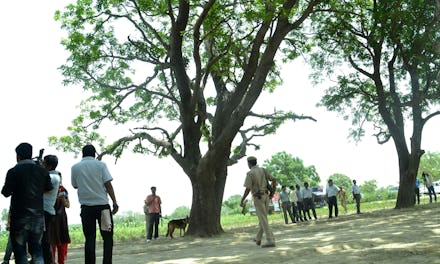There's a New Rape Scandal Rocking India — And This Time, the Police Are to Blame

This is what a hate crime looks like in India: Two teenage girls in northern India, ages 14 and 15, were brutally gang raped, murdered and hanged from a tree. Seven men are believed to have been involved, including two police officers. Not only were two policemen involved, but locals believe that authorities could have prevented the girls' deaths, yet refused to help.
The young girls were allegedly targeted for being members of the Dalit caste, also known as the "untouchables," considered the lowest rung on India's class system. If a hate crime is defined as a crime of hatred or prejudice, then this scenario certainly fits that definition.
The girls were from Katra Shadat Ganj, a village in Uttar Pradesh, a region with 200 million residents, 60 million of whom live in absolute poverty. The rapes that occur in the area, which amount to five cases a day, typically involve upper-caste men targeting lower-caste women.
In India, someone is raped every 22 minutes. The culture of gang rape is fed by social issues like "the resiliency of caste-based sexual violence, police indifference and a tolerance of sexual harassment." Sexual violence in the country is an astronomical problem, with 24,923 reported cases in 2012. Somewhere between 1% and 10% of rape cases actually get reported.
Image Credit: AP
The facts: On May 27, the two girls went to a field to relieve themselves because, "like hundreds of millions of Indians, they lacked a bathroom at home." After they failed to return that evening, one of their fathers (reports conflict as to whether they were sisters or cousins) filed a complaint with the local police station. The police did not follow up.
The next morning, the girls were found hanging from a tree near their homes. While initially police superintendent Atul Saxena told Agence France-Presse, "The girls probably committed suicide," an autopsy later confirmed that they had been raped and strangled.
Police involvement: The father of one victim is certain that if the police responded to his report, the girls would have been rescued. He told the New York Times that the policemen "took the side of the culprits. They abused and misbehaved with us."
The station chief of the local precinct has since been suspended in the aftermath of the incident. But angry villagers and local news stations gathered at the scene of the crime last week (captured in this grisly photo), preventing authorities from removing the hanging bodies until the assailants were arrested.
Even with the arrest of suspect Pappu Yadav and his two brothers (their last name is also the name of the region's dominant caste), local outrage has not been curbed. On Monday, protesters demonstrated in front of the office of Uttar Pradesh's top-elected official, Chief Minister Akhilesh Yadav (no relation).
Image Credit: Getty Images
The locals were rallying for a government crackdown on the escalating number of sexual attacks targeting women and young girls, often from a lower-ranking socioeconomic status.
Image Credit: AP
India has a long history of sexual violence directed at women and girls, which came to the foreground of the global agenda when a 23-year-old woman was fatally gang-raped on a bus in New Delhi in 2012. In response, the country reformed its anti-rape laws last year, making the act punishable by death.
Except last month, the head of Uttar Pradesh's governing party told Al Jazeera America that he opposed the death penalty for gang rapists because "boys will be boys, and they make mistakes." With corrosive ideologies like that staining the country's penal system, it is no wonder that this vicious attack and its aftermath occurred just last week.
Image Credit: AP